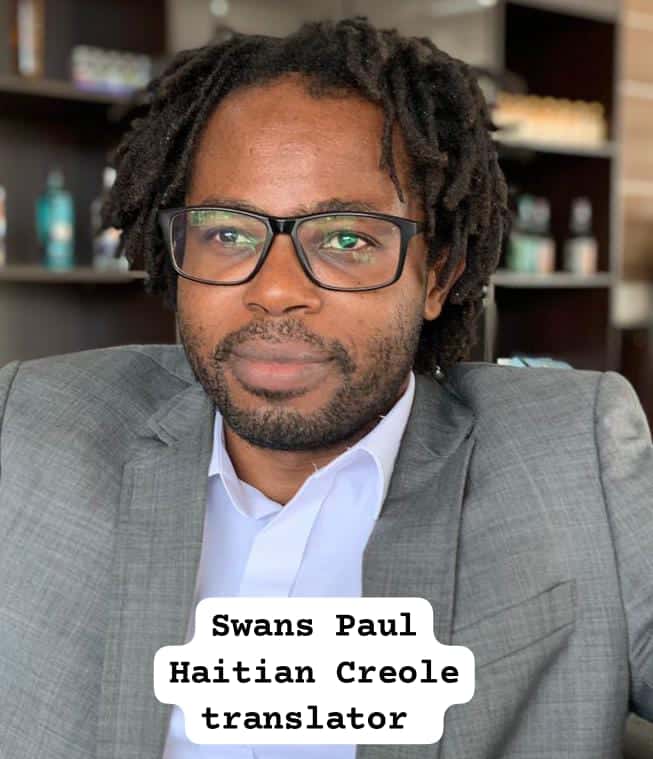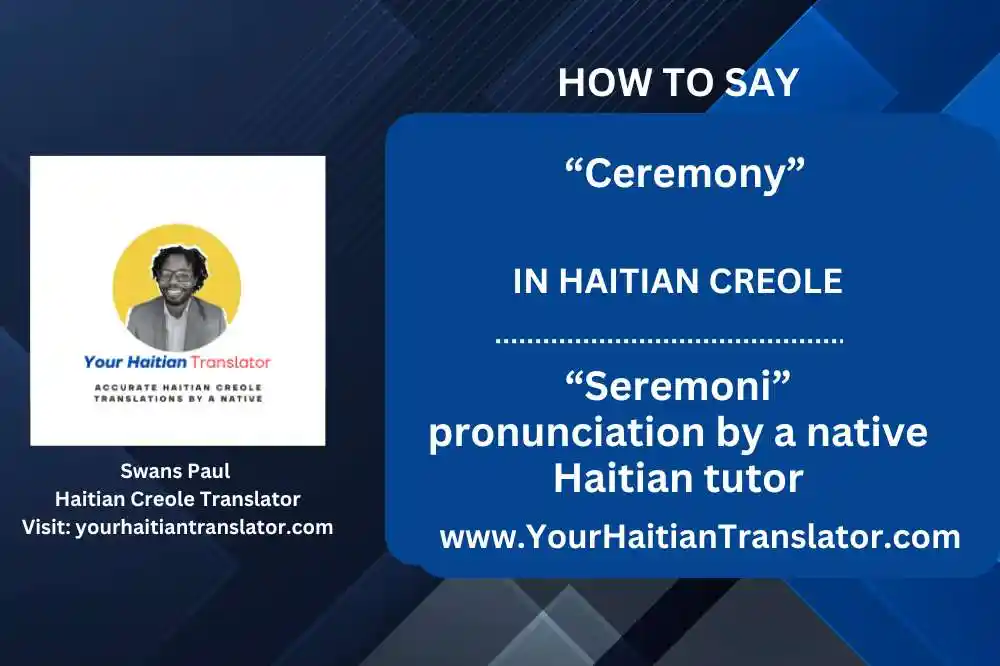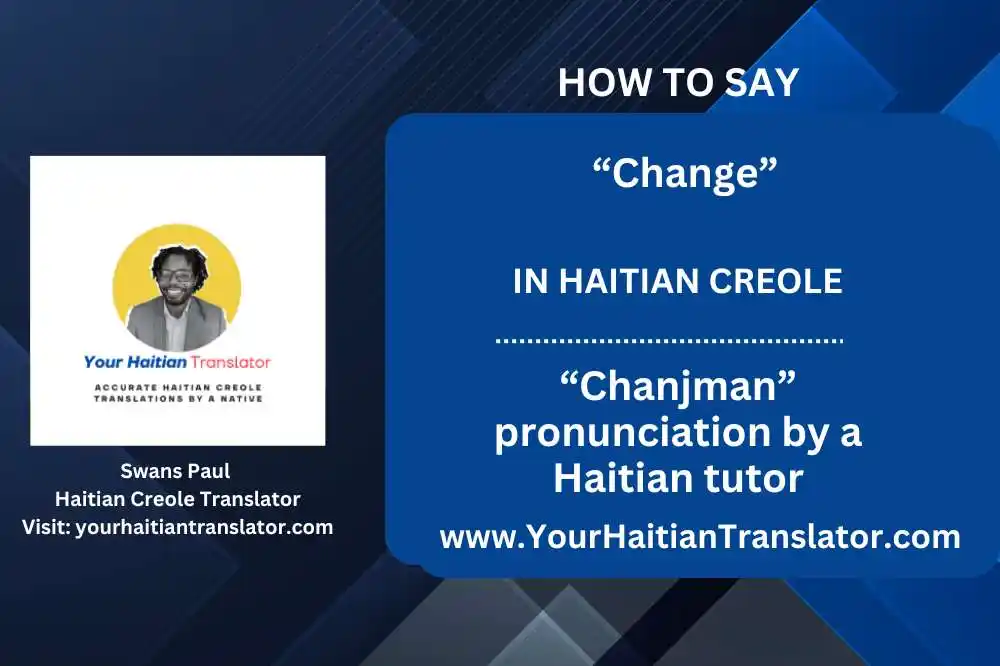Here are the timestamps from the video about how to pronounce “water” in Haitian Creole:
0:00 How to pronounce “Water” in Haitian Creole
0:32 French origin of this Haitian Creole word
0:44 Water is “Dlo” in Haitian Creole
1:14 Where does the Haitian word “Dlo” come from?
1:22 Water is “eau” in French
1:44 From French “de l’eau” to Haitian Creole “dlo”
1:57 Creolization Process: From French “la rue / the street” to Haitian Creole “lari / street”
2:47 Haitianization process: From French “l’église / the church” to Haitian Creole “legliz / church”
3:34 Translate Haitian Creole documentary into English
Here’s the transcript from the video about how to say “water” in Haitian Creole
How to pronounce “Water” in Haitian Creole
0:00
How do you say water
0:01
in Haitian Creole?
0:03
Hi,
0:03
this is Swans
0:04
from yourahitiantranslator.com,
0:06
and as a Haitian Creole voice
0:09
over specialist
0:10
and because Google
0:12
is not
0:13
offering the voice option
0:15
for Haitian translations,
0:17
it is a pleasure
0:18
to share with you
0:19
some tips
0:19
on how to
0:21
properly pronounce Haitian words.
0:23
So let’s get started.
0:25
In this video, I will show you,
0:26
I will share two things with you.
0:28
First,
0:28
how do you say, how to say the word
0:31
“water” in Haitian Creole?
French origin of this Haitian Creole word
0:32
And I will also explain
0:34
the origin,
0:35
the French origin of, of, of
0:37
this very word.
0:38
So let’s get started.
0:40
So how do you say
0:41
water in Haitian Creole?
0:43
It is very simple.
Water is “Dlo” in Haitian Creole
0:44
You say “dlo”.
0:47
One more time, “dlo”.
0:50
One last time, “dlo”.
0:53
So that’s how you say
0:55
water in Haitian Creole.
0:56
And how do you spell it?
0:58
You spell it as
0:59
“D” as in David “L”
1:02
as in low and “O” as in Ohio.
1:05
So it’s “D-L-O”,
1:08
which makes “dlo”
1:10
in Haitian Creole. Right.
1:12
And now where does, where does,
Where does the Haitian word “Dlo” come from?
1:14
where does the word come from?
1:16
It comes from the French.
1:18
It comes from “de l’eau”.
1:20
Because in French,
Water is “eau” in French
1:22
the word water is “EAU”,
1:25
which is spelt as “E-A-U”.
1:28
But I suppose that back,
1:31
back in the days
1:32
my ancestors would have heard,
1:33
“de l’eau”.
1:35
But if you say it very quickly,
1:37
“de l’eau”, “de l’eau”
1:40
can quickly become “dlo”,
1:43
“de l’eau”, “de l’eau”, “dlo”.
From French “de l’eau” to Haitian Creole “dlo”
1:44
So it went from “de l’eau”, “some
1:48
water” to “dlo”,
1:50
which means by itself
1:51
now “water”.
1:52
We have a lot of words in Haitian
1:53
Creole like that.
1:54
We have like, for example,
1:56
in French,
Creolization Process: From French “la rue / the street” to Haitian Creole “lari / street”
1:57
you would say “the
1:58
street” would be “la rue”.
2:00
That’s French.
2:01
So “the, la” and “rue, street”.
2:04
But in Haitian
2:05
Creole,
2:06
the word
2:07
street alone would be “lari”.
2:09
So we would be combining
2:12
the definite
2:13
article “la”
2:15
with the word itself “rue”,
2:16
and we would be dropping the “U”
2:21
sound to
2:22
to collect, to put an “I” sound.
2:25
So “la rue”
2:28
is French for “the street”.
2:31
“Lari” is,
2:32
Is Haitian Creole for “street”.
2:36
Okay.
2:37
So this is the process
2:39
of creolization a little bit.
2:41
Not all the time,
2:41
but this is very common.
2:43
Same thing goes for church,
2:44
for example, you know, in French.
Haitianization process: From French “l’église / the church” to Haitian Creole “legliz / church”
2:47
The church would be “l’église”.
2:50
Okay.
2:51
So it’s two, it’s two words; the
2:53
the definite article
2:54
an apostrophe, for “le” or “la”.
2:56
And then you have “église”.
2:59
Okay.
2:59
So “église” by itself
3:01
would be church,
3:02
but “the church”
3:04
would be “l’église”
3:05
now in Haitian Creole.
3:06
We put all of it together.
3:07
We just say “legliz”.
3:10
So what was two words
3:12
in French becomes
3:13
one word in Haitian Creole.
3:15
It doesn’t always happen
3:16
like that, but it is part
3:16
of the creolization process.
3:18
Okay.
3:19
So I hope the video was useful.
3:21
And if it was useful,
3:22
please give me a like.
3:24
And of course, should you have
3:26
a video in Haitian
3:27
Creole or an audio
3:29
recording in Haitian Creole?
3:30
Let’s say that you received
3:31
a voice message in Haitian Creole
Translate Haitian Creole documentary into English
3:34
or you have a documentary
3:35
in Haitian Creole
3:36
and you want it translated
3:37
into English.
3:38
I can certainly help you
3:39
with that.
3:40
As always,
3:40
the first minute is free.
3:42
This is a way for you
3:43
to test my services
3:44
to see if it’s really up to par.
3:46
And of course, after you received
3:48
that first transcript,
3:49
you can elect,
3:50
you can choose to continue
3:52
with the process
3:53
of giving me the whole project.
3:54
And I can translate the whole
3:56
audio recording or video
3:58
recording or documentary from
4:00
Haitian Creole
4:02
into English
4:02
or from English
4:04
into Haitian Creole.
4:05
Thank you so much for your time.
4:06
Until the next video.

Swans Paul, Haitian Creole Translator, (and a polyglot who speaks Haitian Creole, French, English, Brazilian-Portuguese, Spanish, and some Italian), born in Haiti and college-educated in the US. Over 9 years of experience in Haitian Creole translation, transcription, editing. Worked as a Haitian Creole translator in two movies: the Will Smith Movie: Emancipation; and “The Exorcist: Believer”.
Related Posts
“Ceremony” translates as “Seremoni” in Haitian Creole + “Seremoni” pronunciation in Haitian Creole Meaning: “Ceremony” = “Seremoni” Pronunciation: “Seremoni” Pronunciation in Haitian Creole by a native Haitian can be heard [...]
“Change” translates as “Chanjman” in Haitian Creole + “Chanjman” pronunciation in Haitian Creole Meaning: “Change” = “Chanjman” Pronunciation: “Chanjman” Pronunciation in Haitian Creole by a native Haitian can be heard [...]



